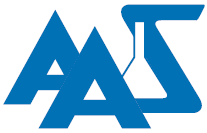African Academy of Sciences
 | |
| Formation | 1985 |
|---|---|
| Headquarters | Nairobi, Kenya |
Region served | Africa |
President | Felix Dapare Dakora |
| Website | www |
The African Academy of Sciences (AAS) is a non-aligned, non-political, not-for-profit pan African organization. The AAS's vision is to see transformed lives on the African continent through science.
Its mandate is to pursue excellence by recognising scholars and achievers; provide advisory and think tank functions for shaping the continent's strategies and policies; and implement key science, technology and innovation (STI) programmes that impact developmental challenges. The AAS and the New Partnership for Africa’s Development Planning and Coordinating Agency (NEPAD Agency) created the Alliance for Accelerating Excellence in Science in Africa (AESA), an Africa-led, Africa-centred, and Africa specific platform for accelerating scientific excellence, leadership and innovation and serving the goal for implementing STI programmes. The AAS recognises excellence through the election of AAS fellows and affiliates. The AAS also awards the Obasanjo Prize for Scientific Discovery and Technological Innovation every two years to an outstanding scientist who contributes to the development of the continent. The AAS fellows and affiliates are distinguished researchers who represent the most talented and promising men and women in and outside the continent, from 59 countries across the globe.
Fellows are Africans who may live in or outside the continent and working on science in Africa are elected by previously elected AAS fellows based on achievements that include their publication record, innovations, leadership roles and contribution to policy. Affiliates are promising early career scientists likely to become world class research leaders. Currently, the AAS has 62 affiliates, who are from countries that include Benin, Cameroon, Ghana, Kenya, Nigeria, Tanzania, South Africa and Zimbabwe.
Fellows form a community of scientists, which is poised to engage with governments and policy makers to enable wise investment in the future of the continent. The Academy, through its think tank functions, encompasses policy and advocacy, to identify, articulate, and evaluate timely science, technology and innovation (STI) policy issues to create a policymaking framework. This initiative also provides a robust forum for the exchange of ideas and information among key stakeholders in order to guide and inform initiatives to positively impact STI investment throughout Africa.[1]
History
The Academy was founded in 1985 following a proposal presented by the renowned entomologist Thomas Odhiambo at the inaugural meeting of The World Academy of Sciences (TWAS), in Trieste, Italy. Odhiambo led a taskforce on the creation of The Academy, which presented its recommendations at a meeting convened on 10 December 1985. Participants at the meeting unanimously adopted the recommendations, turned the gathering into a General Assembly and drafted and adopted the Academy's founding constitution, which has since been updated. The 33 participants who attended the General Assembly also became the founding fellows of the Academy.
The Academy also developed and implemented four strategies between 1989 and 2005 that focused on forestry research, biotechnology, soil and water management, improved food production and policy and advocacy. In 1988 the AAS launched the journal Discovery and Innovation, which focused on all areas of science and ran until 2012.
At first the Academy was largely unfunded and run by volunteers. Between 1993 and 1996 Carnegie Corporation of New York and the Rockefeller Foundation helped the organization establish efficient institutional and financial systems.[2] In May 2005 the Kenyan government gave official recognition to the Academy and extended to it diplomatic privileges given to international non governmental organisations headquartered in Kenya. It also authorized construction of its headquarters on a 2 hectares (4.9 acres) site that it owns in the Karen area of Nairobi. A US$5 million endowment from the Nigerian government was used to cover the cost of construction.[3] As of 2017 the AAS had 396 fellows from 59 African countries.
On 28 February 2011 Ahmadou Lamine Ndiaye of Senegal was appointed President of the AAS for a three-year term replacing Mohamed Hassan of Sudan. He is the first francophone to hold this position since the AAS was founded. Ndiaye said he wanted to rejuvenate the AAS, and felt that conditions were favorable. He aimed to open up centers of excellence on the continent where French and English speakers could work on joint research programs.[4]
Governance
The AAS is governed by:
- A general assembly that consists of AAS fellows and is the highest authority of the academy, which determines its general policy and has an oversight of the governing council
- A governing council, that consists of 15 officers elected by the General Assembly which meets twice a year to create and review the Academy's programmes
Members of the Governing Council
The governing council of the academy has the following members:[5]
- Felix Dapare Dakora, President
- Barthelemy Nyasse, Secretary General
- Dominic Makawiti, Treasurer (deceased March 2018)
- Mahmoud Abdel-Aty, Vice President, North Africa
- Elly Sabiiti, Vice President, East Africa
- Vincent P. K Titanji, Vice President, Central Africa
- Robert T. Guiguemdé, Vice President, West Africa
- Boitumelo Kgarebe, Vice President, Southern Africa
- Theonest K. Mutabingwa, Regional Representative, East Africa
- Richard T. Awuah, Regional Representative, West Africa
- Akissa Bahri, Regional Representative, North Africa
- Colleen Masimirembwa, Regional Representative, Southern Africa
- Juma Shabani, Regional Representative, Central Africa
- Aderemi Kuku, Immediate Past President
- Nelson Torto, Executive Director (ex-officio member)[6]
References
- ^ "History". African Academy of Sciences. Archived from the original on 2019-01-10. Retrieved 2019-01-10.
- ^ "AAS History: Inauguration and establishment: Phase 1 (1985–1988)". AAS. Retrieved 2011-12-02.
- ^ David Dickson (13 May 2005). "Kenya boosts outlook for African Academy of Sciences". SciDev. Retrieved 2011-12-02.
- ^ Boubacar Kante (8 March 2011). "Ahmadou Lamine Ndiaye veut décloisonner les centres d'excellence du continent". Agence de Presse Sénégalaise. Retrieved 2011-12-02.[permanent dead link]
- ^ "Governance". African Academy of Sciences. Archived from the original on 2019-01-10. Retrieved 2019-01-10.
- ^ "Members of the Governing Council". African Academy of Sciences. Archived from the original on 2019-01-10. Retrieved 2019-01-10.
